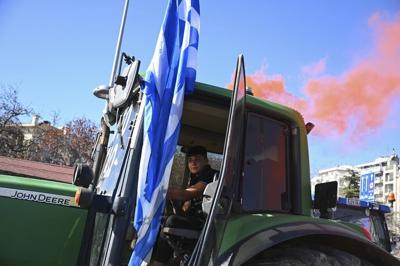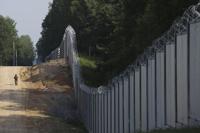BRUSSELS (AP) ÔÇö The European UnionÔÇÖs executive arm shelved an anti-pesticides proposal Tuesday in yet another concession to farmers after weeks of protests blocked major capitals and economic lifelines across the 27-nation bloc.
Although the proposal had languished in EU institutions for the past two years, the move by European Commission President Ursula von der Leyen was the latest indication that the bloc is willing to sacrifice environmental priorities to keep the farming community on its side.
Farmers have insisted that measures like the one on pesticides would only increase bureaucratic burdens and keep them behind laptops instead of farming, adding to between their products and cheap imports produced by foreign farmers without similar burdens.
The pesticides ÔÇťproposal has become a symbol of polarization,ÔÇŁ von der Leyen told the European Parliament in Strasbourg, France. ÔÇŁTo move forward, more dialogue and a different approach is needed.ÔÇŁ
She acknowledged that the proposals had been made over the heads of farmers.
ÔÇťFarmers need a worthwhile business case for nature-enhancing measures. Perhaps we have not made that case convincingly,ÔÇŁ von der Leyen said.
It is unclear when new proposals will be drafted. EU parliamentary elections are set for June, and the plight of farmers has become a focal point of campaigning, even pushing climate issues aside over the past weeks.
Under its much-hyped European Green Deal, the EU has targeted a 50% cut in the overall use of pesticides and other hazardous substances by 2030. The proposal was criticized both by environmentalists who claimed it would be insufficient to reach sustainability targets, and by agriculture groups who insisted it would be unworkable and drive farmers out of business.
The decision to shelve the proposal on pesticides represented the EU's latest act of political self-retribution in reaction that have affected the daily lives tens of millions of EU citizens and cost businesses tens of millions of euros due to transportation delays.
Many politicians, especially on the right and its fringes, applauded the impact of the protests.
ÔÇťLong live the farmers, whose tractors are forcing Europe to take back the nonsense imposed by multinationals and the left,ÔÇÖÔÇÖ said Italy's right-wing transport minister, Matteo Salvini.
Last week, von der Leyen to shield farmers from cheaper products exported from wartime Ukraine and to allow farmers to use some land they had been required to keep fallow for environmental reasons.
The European Commission is set to announce more measures late Tuesday on how to reach its stringent targets to counter climate change. Environmentalists fear their could be more concessions there, too.
In France, where the protests gained critical mass, more than 400 million euros ($436 million) in additional financial support.
Meanwhile, in many EU nations.
Since early Tuesday morning, farmers across Spain have staged tractor protests, blocking highways and causing traffic jams to demand of changes in EU policies and funds and measures to combat production cost increases. The protests came as the Agriculture Ministry announced some 270 million euros in aid to 140,000 farmers to address drought conditions and problems caused by RussiaÔÇÖs war against Ukraine.
On Monday night, farmers in the Netherlands blocked several roads and highways with their tractors and torched hay bales and tires.
Police in the rural province of Gelderland said they took action against farmers blocking roads, but there were no immediate reports of arrests.
In recent weeks, farmers have protested from Poland to Greece, and from Ireland over Germany to Lithuania.
___
Mike Corder contributed from The Hague, Ciaran Giles from Madrid and Colleen Barry from Milan.








































